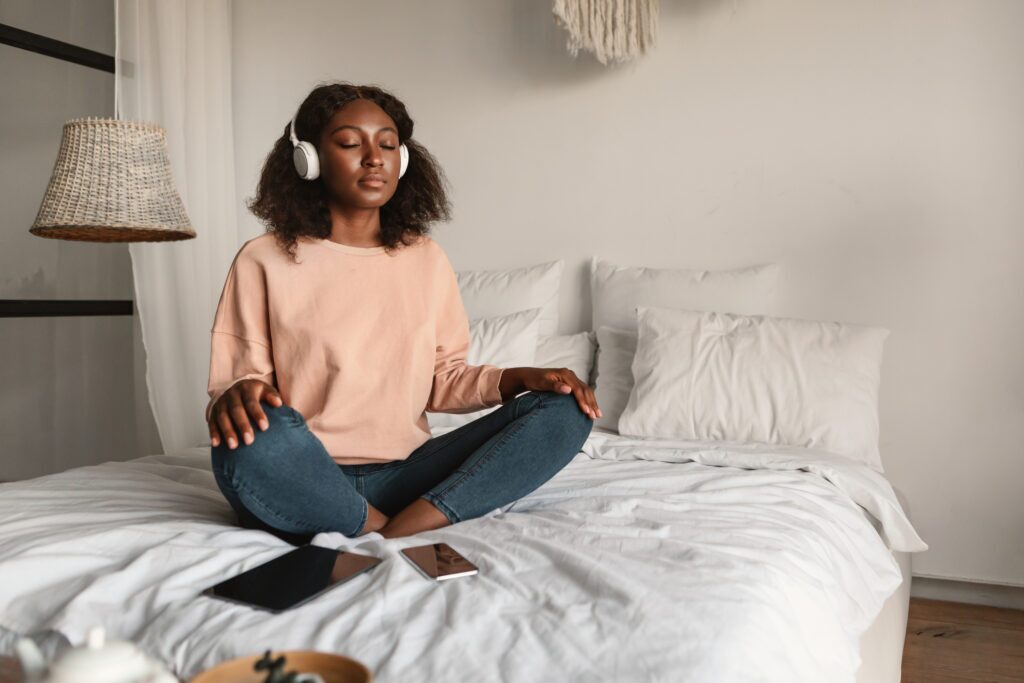Medical Review by Jennie Stanford, MD, FAAFP, DipABOM
Summary
- Anxiety disorders are the most common form of mental illness in the United States.
- There are different types of anxiety disorders, such as generalized anxiety disorder, panic disorder, social anxiety disorder, obsessive-compulsive disorder, and illness anxiety disorder.
- Anxiety can impact many situations in daily life, including job productivity, morning routines, social interactions, and sleep.
- Coping mechanisms can help manage symptoms and navigate everyday life. Strategies include incorporating mindfulness practices, practicing gratitude, engaging in self-care activities, exercising, taking breaks at work, gradually facing social situations, using relaxation techniques, and creating calming morning and nighttime routines.
- Online support and resources, such as those provided by Lemonaid Health, are available to access accessible care for daily challenges related to anxiety.
Navigating the day-to-day with anxiety disorders
Did you know an estimated 31.1% of U.S. adults experience an anxiety disorder at some point in their lives? In fact, anxiety disorders are the most common form of mental illness in the United States.
While occasional worry is a normal part of being human, anxiety disorders can interfere with your daily life and activities, like work performance, social interactions, sleep, and other responsibilities.
If you’re living with anxiety, there are coping mechanisms to help you manage your symptoms and better navigate everyday life. In this article, we’ll explore the impact of anxiety disorders on everyday situations and some tools to help you cope with your anxiety day to day.
Different types of anxiety disorders
There are several types of anxiety disorders. These include the following:
- Generalized anxiety disorder (GAD): This type of anxiety usually involves feeling persistent anxiety or dread, which can interfere with your daily life. This is not the same as occasional worrying or being anxious due to specific life events – people with GAD experience anxiety for months or years.
- Panic disorder: People with this disorder experience frequent panic attacks at unexpected times. They often worry about when the next attack will happen and may avoid certain places, situations, or behaviors to try and prevent future attacks.
- Social anxiety disorder: This is an intense fear of being watched and judged by others in social situations. This fear may get in the way of doing everyday things, including going to work or school.
- Obsessive-compulsive disorder (OCD): People with this disorder experience uncontrollable and recurring thoughts and/or engage in repetitive behaviors. These time-consuming symptoms can interfere with daily life.
- Illness anxiety disorder (formally called hypochondria): This is when you experience anxiety and preoccupation with your health. Many people with this disorder are often unable to function or enjoy life due to these fears and preoccupations.
Morning routines & anxiety
If you’re living with an anxiety disorder, you may feel symptoms like a sense of panic or doom or a racing heart as soon as you wake up in the morning. This experience has a biological cause: cortisol (the “stress hormone”) is higher during the morning for people experiencing stress.
In addition, this anxiety may drive you to engage in habits that may increase stress and anxiety, like compulsively checking your smartphone notifications when you first wake up.
Creating and sticking to a calming morning routine or ritual may help you reduce anxiety and set yourself up to cope with your everyday anxiety. Here are a few ideas to add to your morning routine:
- Meditation: Incorporating mindfulness into your morning routine can help ease anxiety and stress. You can use a meditation app or set a timer for 10 minutes and create your own mindfulness practice.
- Practice gratitude: Write down three things you’re grateful for every morning.
- Self-care: Instead of hitting snooze, use this extra time to do something that makes you feel good. Enjoy an extra cup of tea or coffee, listen to a podcast, read a chapter of your book or listen to your favorite relaxing playlist.
- Exercise: Exercising for just 30 minutes a day can boost your mood and improve your health. Head outside for a walk or find an online workout you enjoy.
Work & productivity challenges
Poor mental health and stress can negatively affect job performance and productivity. They can also impact your engagement at work, communication with coworkers, physical capability, and daily functioning.
Here are some strategies and ideas to manage your anxiety at work:
- Pack a healthy and well-balanced lunch and snacks
- Manage and reduce stress with relaxing activities like yoga or meditation
- Set realistic work-related goals
- Building and nurturing social connections with colleagues
- Take advantage of mental health management and programs that your workplace offers
Social interactions & anxiety
A person with anxiety can have a hard time doing everyday things, such as going to work, socializing, speaking in public or presenting at work, meeting new people, dating, or having to talk to people in stores.
People with social anxiety specifically can worry about social situations for weeks leading up to the event, or may avoid places or events that cause distress or embarrassment altogether. This can result in an exhausting and challenging day-to-day and potentially missing out on important life events.
Here are some ways to navigate social interactions when you have an anxiety disorder:
- Learn and practice social skills (a psychotherapy treatment such as cognitive behavioral therapy (CBT) can help with this)
- Educate yourself about treatment options and research
- Join a support group either in person or online
- Speak openly about how you’re feeling with someone you trust
- If your anxiety starts to cause problems like avoiding social situations at work or with friends and family it may be time to seek help from your health care provider
Sleep disturbances & anxiety
Sleep is essential for good health, quality of life, and well-being. However, many people with anxiety disorders experience sleep disturbances, particularly insomnia. Here are some tips to improve your sleep hygiene:
- Try to maintain the same sleep schedule seven days a week – go to bed at the same time each night and wake up at the same time each morning
- Keep naps short and take them before mid-afternoon
- Try to get natural sunlight every day (at least 30 minutes is ideal)
- Avoid caffeine and nicotine
- Avoid alcohol before bed
- Limit distractions before bed to optimize your sleep – try doing something relaxing like reading or listening to music instead
- Keep your bedroom cool, dark, and quiet to create a good sleep environment
Online support & resources with Lemonaid Health
Anxiety disorders can have a significant impact on your daily life, affecting work, social interactions, relationships, and sleep. However, knowing that you can develop coping mechanisms to manage your symptoms and navigate everyday challenges can help you improve your future quality of life.
In addition to incorporating these daily coping tools, you can find anxiety relief with Lemonaid Health.
It is important to remember that everyone’s journey with anxiety is unique. Therefore, it is essential to seek help from your health care provider when needed.












